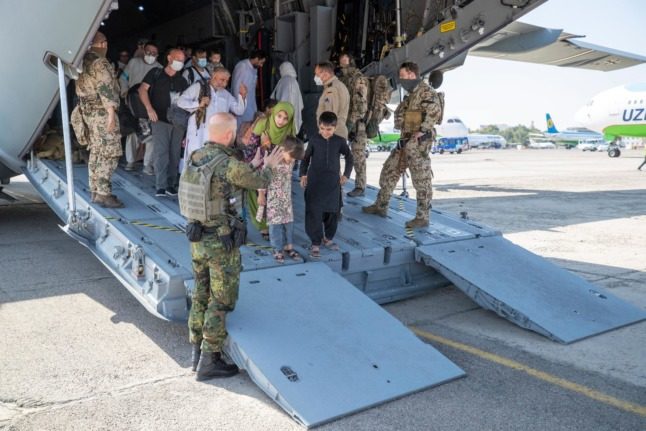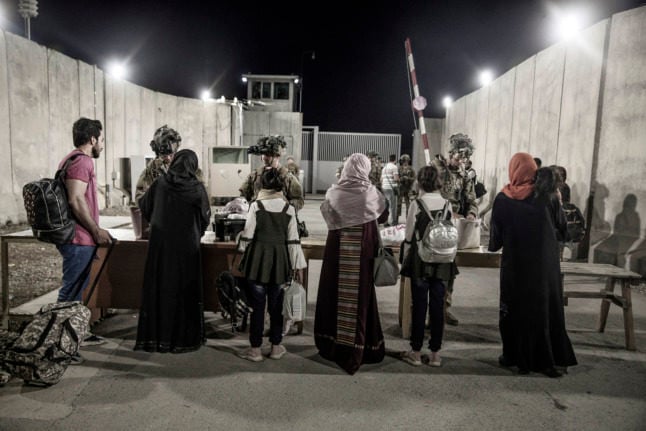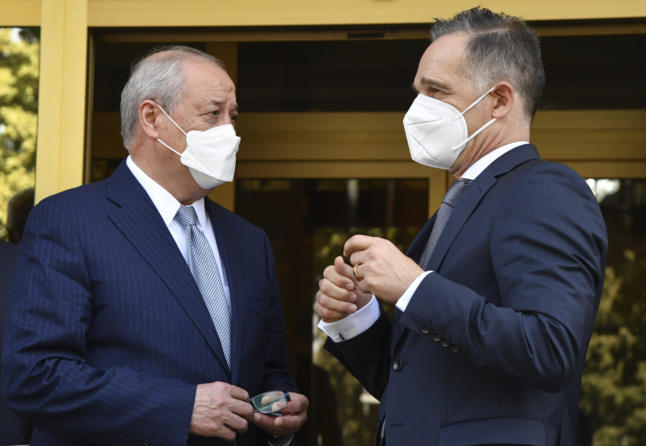The Bundeswehr (German army) has brought more than 1,600 people out of the Afghanistan capital Kabul to safety through its airlift operation so far, DPA said on Friday morning.
Two more planes from Kabul carrying a total of more than 360 people landed in the Uzbekistan capital of Tashkent early Friday. From there, the refugees – including German citizens and Afghan support colleagues – will be taken onward to Germany by civilian aircraft.
But there may still be hundreds of German citizens in Afghanistan – more than previously thought, experts fear. According to DPA, “a mid-three-digit number” of Germans have registered on a Foreign Office list.
About 60 Afghan local staff and their relatives, including several children, arrived in the state of Brandenburg early on Friday, the state reported.
They will spend three days in quarantine before being moved to other accommodation.
READ ALSO:
- ‘The world needs to help’: Germany scrambles to evacuate people from Afghanistan
- Why a German military plane rescued just seven people from Kabul
A NATO official told Reuters news agency that more than 18,000 refugees have been flown out of Kabul airport by allied forces since the Taliban swept to power at the start of this week.
Relative of journalist ‘killed by Taliban’
The desperate evacuation by allies in Kabul is happening while concerns are growing over the behaviour of the militant group.
Taliban fighters shot and killed a relative of a Deutsche Welle journalist while hunting for him, the German public broadcaster said.
The militants were conducting a house-to-house search for the journalist, who now works in Germany, DW said Thursday.
A second relative was seriously wounded but others were able to escape, it said, without giving details of the incident.
DW director general Peter Limbourg condemned the killing, which he said showed the danger to media workers and their families in Afghanistan.
“The killing of a close relative of one of our editors by the Taliban yesterday is inconceivably tragic, and testifies to the acute danger in which all our employees and their families in Afghanistan find themselves,” he said.
“It is evident that the Taliban are already carrying out organized searches for journalists, both in Kabul and in the provinces. We are running out of time!”
READ ALSO: German states vow to take in thousands of refugees
The Taliban had raided the homes of at least three other DW journalists, the broadcaster said.
DW and other German media organisations have called on the German government to take swift action to help their Afghan staff.
After taking Kabul, the Taliban launched a public relations blitz promising media freedom and a pardon for all their opponents.
However, a confidential UN document seen by AFP says they are intensifying their search for people who worked with US and NATO forces.
Later on Friday, the German government said a German civilian was shot on his way to the airport. They said his life was not in danger.
Aid to support refugees in Middle East
Meanwhile, the German government has announced €100 million in emergency aid for Afghan refugees.
The money is to be used to support international aid organisations on the ground.
Tens of thousands of people are currently trying to flee Afghanistan to neighbouring countries.
With just five weeks until the federal election in Germany, politicians are debating the best way of dealing with the international crisis.
CDU/CSU candidate for chancellor Armin Laschet spoke out in favour of holding talks with the Taliban in order to help people in danger in Afghanistan.
“The art of good foreign policy consists precisely in coming to solutions with these kinds of states, whose goals and image of humanity our society rightly rejects,” the CDU leader told the Neue Osnabrücker Zeitung.
“Refusing to engage in dialogue with the Taliban would not help the people who want to get out of Afghanistan.”
The German government has faced criticism from the opposition over not acting quickly enough to evacuate citizens and Afghan support staff.
The situation has also brought back memories of the 2015 refugee crisis when Chancellor Angela Merkel embarked on an ‘open-door policy’ for migrants.
The decision changed the political landscape of Germany, resulting in the huge rise in support for the anti-immigration and far-right party Alternative for Germany (AfD).
READ ALSO: Five years on: How well did Germany handle the refugee crisis




 Please whitelist us to continue reading.
Please whitelist us to continue reading.
Member comments